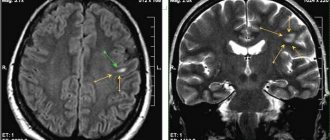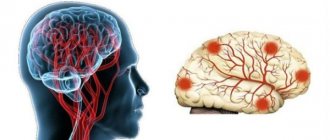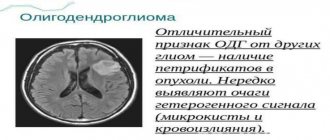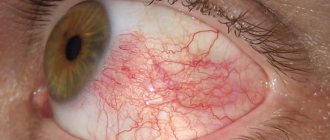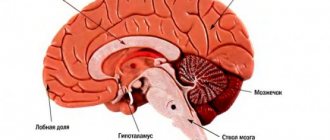general description
Dementia (dementia) is a chronic or progressive mental disorder, which is characterized by persistent impoverishment of mental activity with disruption of a number of higher cortical functions, up to the loss of basic skills and the ability to self-care (aphasia, alexia, apraxia), accompanied by impoverishment of emotions, impaired emotional control , behavior or motivation.
Senile (senile) dementia develops in people over 65 years of age.
The most common causes of dementia in old age are Alzheimer's disease (50–60%), cerebrovascular disease (5–10%), a combination of both (15–20%) and specific variants of the disease (Parkinson's, Pick's, Huntington's, etc. .d.). Determining the cause of dementia plays an important role in choosing adequate therapy that can slow down the course of the disease.
Alzheimer's disease is more common in old and senile age; according to international studies, its prevalence at the age of 75 years is 4%, 85 years - 16%, 90 years and older - 32%, and in older women it is significantly higher compared to similar men age. Late age, cases of dementia in old age in relatives, and the presence of the apolipoprotein E gene are important. Traumatic brain injury, thyroid disease, and stress factors may also contribute to the development of this disease. It is believed that risk factors also include an increased concentration of aluminum in water consumed orally. Smoking, long-term use of NSAIDs and estrogens, and regular drinking of alcohol in small doses presumably reduce the likelihood of the disease. Most often, Alzheimer's disease is differentiated from vascular dementia, which occurs against the background of chronic cerebrovascular insufficiency due to atherosclerosis, hypertension, and chronic cardiovascular insufficiency.
In case of vascular dementia, an anamnesis of the disease is important - an acute onset, previously suffered disorders (including transient) of cerebral circulation with transient neurological disorders or confusion, a gradual increase in symptoms, partial disturbances of higher cortical and subcortical functions.
The most significant assistance in establishing the possible cause of dementia is provided by an MRI/MSCT image of the brain, so with senile dementia of the Alzheimer’s type, diffuse (frontotemporo-parietal, at the beginning - temporo-parietal) atrophy (decrease in volume) of the brain, changes in the periventricular zone and zones of the centrum semiovale, an increase in the interunicular distance compared to the age norm, a decrease in the volume of the hippocampus (an early diagnostic sign), an increase in the perihippocampal fissures. Multi-infarct vascular dementia is characterized by the presence of “foci” of altered density of the brain matter and not a pronounced expansion of the ventricles and/or subarachnoid spaces; with Binswanger vascular encephalopathy, changes in the white matter of the brain (leukoaraiosis).
The main symptom of dementia is a pronounced impairment of cognitive functions, leading to disruption of the patient’s daily life, his maladjustment, lasting at least 6 months, while maintaining clear consciousness. In other cases, the diagnosis can only be presumptive and requires a differential approach. In the early stages of dementia, emotional disturbances and sharpening of personality traits may be observed.
Causes and clinic of dystrophic processes
The causes of weakening of brain functions in old age may be:
- In the case of vascular dementia , a history of hypertension, atherosclerosis, and stroke is noted. Thus, the cause of this pathology is impaired blood supply to parts of the brain. For this reason, massive death of neurons occurs. In this case, the pathology is considered incurable. Cells have a low ability to regenerate in old age.
- In the atrophic type of dementia, a history of Pick's disease, Alzheimer's, and Parkinson's disease should be noted. There is cerebrovascular insufficiency here. Alzheimer's disease more often affects older women. Prerequisites for its occurrence are genetic predisposition, alcohol and smoking, severe stress, thyroid pathologies or traumatic brain injuries.
- The mixed type is characterized by a combination of vascular pathologies with atrophic changes.
Article on the topic: Dry pleurisy - treatment of lung disease
Among the causes of the disease are also brain tumors, chronic alcoholism, and severe viral infections.
Vascular etiology of dystrophy
Vascular dementia accounts for 25% of cases. It develops with chronic oxygen starvation of brain cells due to vascular disorders in the organ. The cause may be congenital vascular defects, diabetic angiopathy and stroke.
At risk are people who lead a sedentary lifestyle, have an unhealthy diet and are addicted to alcohol. Patients with obesity, diabetes mellitus, arterial hypertension and atherosclerosis are susceptible to vascular degeneration.
With this pathology, the patient’s thinking process is disrupted and he is unable to identify the logical connection of events. A person loses his things that are in plain sight. The appearance loses its neatness. In this state, tearfulness, apathy, and unpredictable mood swings are often observed. Due to decreased physical activity, a person sleeps a lot.
Alzheimer's type dementia
Despite the fact that this type of disease is the most common, it is very difficult to distinguish it from vascular dementia. Often the correct diagnosis is determined after the death of the patient.
At risk are women over 70 years of age, patients with atherosclerosis and diseases of the endocrine system, and people with unfavorable heredity.
At the beginning of the development of Alzheimer's brain degradation, there is a decrease and partial loss of short-term memory, and later long-term memory.
In patients, an aggressive state may predominate. They behave rudely and lack the attention of loved ones.
Progressive pathology further causes delusions of persecution, delusions of grandeur and other similar deviations.
The tendency to wander is manifested by frequent leaving home. The patient's appearance is sloppy.
Alcohol-type brain dystrophy
This condition develops in people with alcohol dependence over 10-20 years. It is characterized by aggressive behavior, impaired intellectual qualities and apathy.
But in rare cases, when you give up a harmful addiction, the pathological process regresses.
Senility
Elderly people become absent-minded, grumpy, and intractable. Forgetfulness and behavior changes occur due to aging and death of brain cells.
Patients may suffer from insomnia at night and tend to sleep during the day. Mental disorders, touchiness and tearfulness are typical for them. Apathy and even hallucinations may occur.
The cause of these disorders may be surges in blood pressure and hyperglycemia.
Epileptic dementia
This is a secondary disease secondary to epilepsy. It is also called functional dementia.
This condition is caused by oxygen deprivation and the consequences of traumatic brain injury and brain tumors. There is a decrease in memory and impaired thinking abilities, accompanied by an indifferent attitude to what is happening.
Patients become rude, selfish and vindictive. A characteristic feature is the use of most words from a poor vocabulary in a diminutive form. With this form of the disease, therapy is aimed at eliminating the underlying cause.
Symptoms of senile brain degeneration
For the diagnosis of dementia, the following symptoms are important: the presence of thinking disorders (decreased ability to abstract, logical thinking, impaired verbal functions); disorders of higher functions (agnosia, apraxia, aphasia, acalculia, agraphia, alexia); memory impairment; attention disorders (ability to respond to several stimuli simultaneously, switching attention); volitional disorders (lethargy, inactivity, lack of initiative or motor disinhibition, unproductive fussiness); disorder of desires and behavior; emotional disorders (affective instability, decreased mood or its unmotivated increase, tendency to a melancholy-angry mood, irritability, “erasing” or grotesque sharpening of personal characteristics); decreased critical attitude towards one’s condition.
The development of the disease goes through a number of stages. The first, so-called pre-dementia, affects fresh layers of memory and the ability to record new information. A person remembers worse, becomes distracted and apathetic, and his ability for abstract thinking decreases.
In the second stage (stage) - early dementia - memory impairment continues to progress. Symptoms of apraxia appear, i.e. movement disorders, and aphasia, i.e. disorders of coherent speech. However, the patient still remembers the basic facts of his life and retains the remnants of common sense.
At the third stage - moderate dementia - a person confuses words, ceases to recognize well-known people, his reading and writing skills decrease, and body coordination is impaired. Elements of delusion and false self-identification arise. Old people can leave home and “get lost”, do not follow the rules of hygiene and cannot perform natural necessities without outside care.
Then comes the stage of severe dementia, when speech is almost completely lost. Characterized by total apathy and exhaustion. The ability to act independently, even the most basic ones, is gradually lost. The patient no longer gets out of bed. Death often occurs not because of the disease itself, but because of associated causes - caused by immobility of pneumonia or bedsores.
On average, seven years pass from the onset of the disease to the death of the patient.
Dementia is divided into partial and total. Partial (dysmnestic, atherosclerotic) is characterized by uneven mental disorders - memory impairment predominates with preservation of the “core of personality” and criticism of one’s position. Total (diffuse, global) corresponds in its manifestations to a severe degree of dementia.
Establishing diagnosis
To make an accurate diagnosis, an anamnesis is collected. On its basis, symptoms are differentiated from depression, severe asthenia and iatrogenic mental disorders (delirium, malingering, and others).
When examining a patient, a neurologist identifies focal symptoms, extrapyramidal disorders and disturbances in walking.
The final diagnosis is made based on the results of magnetic resonance imaging and laboratory tests of the patient.
Article on the topic: Fibromyalgia - symptoms and treatment of the syndrome
Treatment of senile brain degeneration
Treatment is carried out in accordance with the standards of treatment for elderly patients, taking into account the etiology and severity of manifestations of dementia and is aimed at preserving the patient’s usual lifestyle for as long as possible, maintaining their social activity, and correcting symptoms and behavior.
The main areas of dementia therapy are:
- compensatory (replacement) therapy aimed at compensating for neurotransmitter deficiency (cholinergic - "Ipidacrine", "Rivastigmine", "Exelon", "Reminil", "Donepezil"; glutamatergic - "Akatinol memantine", "Noodzheron");
- neuroprotective therapy - the use of drugs with neurotrophic properties (Cerebrolysin, Ceraxon) and neuroprotectors (nootropics, vascular drugs), correction of disorders of free radical processes (antioxidants - vitamin E, gingo biloba preparations, succinic acid), as well as calcium metabolism, etc. .;
- anti-inflammatory therapy;
- psychopharmacotherapy of behavioral and psychotic disorders;
- psychological correction (cognitive training).
Since the disease is based on a progressive neurodegenerative atrophic process, the prognosis of the disease is unfavorable. Therefore, early diagnosis and prevention of the development of dementia is important in cases where this is possible.
Essential drugs
There are contraindications. Specialist consultation is required.
| 1 | Exelon, Alcenorm, Rivastigmine is a selective inhibitor of brain acetylcholinesterase. |
Reception
First, the drug is taken twice a day, 1.5 mg. For patients with hypersensitivity to cholinergic drugs, a lower dosage of 1 mg is recommended. The medicine should be taken with meals in the morning and evening (at breakfast and dinner).
Dosage regimen
After two weeks from the date of first administration of the drug, its normal tolerability should be noted. If the drug does not cause side effects, the dosage can be doubled. After another two weeks, increase the dosage to 4.5 mg 2 times a day, and then to 6 mg and also take twice a day.
Attention! A minimum of 14 days must pass before each dosage increase.
Side effects (weight loss, abdominal pain, nausea, loss of appetite) that may be observed during treatment are eliminated by skipping one or more (until you feel normal) doses of the drug. If a one-time omission does not solve the problem, you need to reduce the dosage to one that is well tolerated by the patient.
| maintenance dose | 1.5 to 6 mg twice daily |
| maximum daily dose | 6 mg twice daily |
It is recommended to follow a dosage that is well tolerated by the patient to achieve maximum therapeutic results.
How to take the drug after a break?
After the break, you must start taking the drug in a minimal amount. This will avoid causing side effects. Then you should gradually increase the dosage of the medicine according to the scheme outlined above (every two weeks - 1.5-2 times).
Mode of application
The solution or capsules are taken orally. Dosages (by milligrams) are interchangeable.
Solution: the required amount of the drug is removed using a dispenser from the bottle - a special device for measuring a given volume of the substance. The medicine is also taken from a dispenser.
| 2 | Memantine hydrochloride (Akatinol memantine, Memantine) is a blocker of glutamate NMDA receptors. |
Dosage regimen
Calculated individually. It is recommended to start taking the drug with the minimum effective dose. Taken orally every day with meals. The optimal amount of medication is achieved gradually. The dosage should also be increased gradually according to the following scheme.
Dosage for adults
| Medication period | Amount of drug (per day) |
| First week | up to 5 mg |
| Second week | up to 10 mg |
| Third week | up to 20 mg |
* In the following weeks, you can increase the dose by 10 mg. Do not exceed the maximum daily dose (30 mg).
| 3 | Citicoline sodium (Neurokson, Citicoline, Ceraxon) is a nootropic drug. |
Dosage regimen
1. Oral solution
Before oral administration, you can dilute the drug in water (at the rate of 120 milliliters per 1/2 cup). Take either between meals or directly during meals.
In case of traumatic brain injury and acute ischemic stroke: undergo a course of treatment for a period of 6 weeks (at the rate of 1000 mg or 10 ml every 12 hours).
During the recovery period after suffering a traumatic brain injury, ischemic and hemorrhagic strokes, as well as in the presence of behavioral and cognitive disorders of vascular and degenerative diseases of the brain: take the drugs once or twice a day, 5-10 ml or 500-2000 mg. The dosage and duration of treatment is calculated individually (based on the severity of the disease).
For elderly patients, no dose adjustment of Citicoline is required.
Rules for using a dosing syringe:
- lower the syringe completely into the bottle;
- slowly pull the piston, comparing the level of the solution with the desired mark on the dosage syringe;
- If desired, dilute the required amount of solution in a glass of plain water (amount of water - 120 milliliters).
Attention! It is recommended to rinse the syringe after each use with plain water.
2. Solution for intravenous and intramuscular administration
Intravenously: administer slowly over three to five minutes or infuse using a medical drip at a rate of 40 to 60 drops per minute.
Intramuscular: carefully, avoid injecting the drug into the same place twice.
Preferable: intravenous method of administering the solution.
| Indications for use | Recommended dosage | Duration of treatment | Switching to oral forms of drugs and their dosage |
| 1. traumatic brain injury; 2. acute period of ischemic stroke. | every 12 hours 1000 mg | at least 6 weeks | It is possible to switch to oral forms of Ceraxon after three to five days from the start of treatment. Provided there is no impairment of swallowing functions. |
| 1. after ischemic and hemorrhagic strokes; 2. for behavioral disorders in vascular and degenerative diseases of the brain; 3. recovery after traumatic brain injury; 4. for cognitive impairment in vascular and degenerative diseases of the brain. | every day 500-2000 mg | depends on the severity of the disease | Patients over 65 years of age do not require any dosage adjustment of Citicoline. |
A solution for intramuscular and intravenous administration in an ampoule is intended for single use. The drug must be used immediately after opening the ampoule. The medicine is compatible with all types of solutions and dextrose and with all types of intravenous isotonic solutions.
Brain degradation
Every day more and more people complain about problems with brain activity - about increasing absent-mindedness (i.e., the inability to concentrate one’s attention, to gather thoughts to solve some problems), about difficulties in remembering information, about the physical inability to read large texts , not to mention books. And they ask to give them something to improve brain activity in general and memory in particular. Moreover, paradoxically, this problem is typical not only and not so much for older people, whose brains are supposed to be weakened by age, but for people of middle age and younger than middle age. At the same time, many are not even interested in why this happens - they automatically attribute it to stress, fatigue, unhealthy environment, the same age, etc., although all this is not even close to the reason. Among my patients there are those who are far from 70, but who have no problems at all with either memory or brain activity. So what is the reason?
And the reason is that, despite any arguments, no one categorically wants to give up the so-called constant, round-the-clock “connection to information.” In other words, the accelerated loss of your brain functions began on that very significant day when you decided to be constantly “in touch”. And it makes no difference whether you were forced to do this by work necessity, languor from idleness, or an elementary fear of not being “on the level”, i.e. fear of being branded a black sheep, an eccentric among one’s own kind.
Back in 2008, it was known that the average Internet user reads no more than 20% of the text on a page and avoids large paragraphs in every possible way! Moreover, special studies have shown that a person constantly connected to the network does not read text, but scans it like a robot - snatches scattered pieces of data from everywhere, constantly jumps from one place to another, and evaluates information exclusively from the position of “sharing”, i.e. e. “Can this “revelation” be forwarded to someone?” But not with the purpose of discussing, but mainly with the purpose of evoking emotions in the form of an animated “burp”, accompanied by short remarks and exclamations in SMS format.
During the research, it turned out that pages on the Internet, as already mentioned, are not read, but are skimmed using a pattern reminiscent of the Latin letter F. The user first reads the first few lines of the text content of the page (sometimes even completely, from beginning to end), then skips to the middle of the page, where he reads a few more lines (as a rule, only partially, without reading the line to the end), and then quickly goes down to the very bottom of the page - to see “how it ended.”
Red - areas where the reader’s attention lingers the longest. Yellow - quick viewing zones. Blue and gray areas are not readable at all
Therefore, the most effective way to present information to the average Internet user is to display information in the form of an inverted pyramid (i.e., according to the principle “the lower, the less”) with the obligatory highlighting of keywords (so that consumers of information understand what is important and what is not very) and revealing no more than one thought per paragraph. This is the only way to keep your attention on the page for as long as possible. If, as you go down the page, the density of information does not decrease or, even worse, increases (as, for example, in this article), then only a few people stay on such pages.
My personal opinion is:
The Internet is a real drug. What is a drug? This is a completely useless thing, without which anyone can live perfectly well until they try. And when he tries, he becomes dependent for life - drug addiction cannot be cured
People of all ranks and specialties complain about problems with the perception of information - from highly qualified university professors to service workers who maintain washing machines. Such complaints can be heard especially often in academic environments, i.e. from those who, by the nature of their work, are forced to communicate closely with people on a daily basis (teach, give lectures, take exams, etc.) - they report that the level of reading and perception skills of those with whom they work is already low , year by year it falls lower and lower.
Most people have enormous difficulty reading large texts, let alone books. Even blog posts longer than three or four paragraphs already seem to most to be too difficult and tedious to understand, and therefore boring and not worthy of even basic understanding. There is hardly a person who has not heard the popular online saying “too many letters - can’t handle it,” which is usually written in response to a proposal to read something longer than a couple of dozen lines. It turns out to be a vicious circle - there is no point in writing a lot, since almost no one will read it, and reducing the volume of transmitted thoughts leads to even greater poverty of not only readers, but also writers. As a result, we have what we have—mass dullness.
Even people with (in the past) good reading skills say that after a whole day of surfing the Internet and maneuvering through dozens and hundreds of emails, they physically cannot begin even a very interesting book, because reading just the first page turns into real torture.
Reading simply “doesn’t work”, first of all, because:
a) I can’t force myself to stop scanning the text, looking for keywords in it and
b) the complex syntax characteristic of most classical, high-content or knowledge-intensive works is completely inaccessible, which is completely absent in the exchange of telegraphic “SMS burps”.
As a result, one sentence has to be re-read several times! The most outspoken people say this directly: I am disgusted/disgusted with myself.
But that's not all. Due to constant connection to the Internet, such human skills as the ability to return to once meaningful information, analyze what has been read, and connect the imagination sharply deteriorate. What’s even worse is that in 80% of cases, people go to the Internet for dubious entertainment, or get information from there that has not only zero, but negative cultural value.
At the same time, most people (especially young people) are so attached to their gadgets that if they threaten to be disconnected from the network for at least one day, they experience not only mental depression bordering on panic, but also real physical withdrawal, reminiscent of drug addiction. Don't believe me? Come on, turn off your soap dish COMPLETELY and try to live without it for at least 2-3 days
There is an opinion, which I fully share, that the ability to effectively perceive complex texts and read complex literature will soon become an elite privilege, available only to a special caste of people. This idea is not new, since Umberto Eco, in his novel “The Name of the Rose,” proposed that only those who can and are ready to perceive complex knowledge should be allowed into the library. And everyone else will be able to read only signs and the Internet.
In short, no pills, no supplements, no diets, no shrinks, etc. unable to stop brain degradation. There is only one thing that can stop it - stopping the flow of all kinds of information garbage into the processing system and daily loading the brain with so-called “useful information.” This process is extremely difficult, and for many people it is completely impossible. For many, the train, as they say, has already left.
Once again, briefly:
- Gadgets that ensure your constant connection to information/Internet - smartphones, iPads, etc., without which you now cannot even go to the toilet - make you practically a moron with a sluggish, apathetic, barely thinking brain that is not able to think and analyze . But, like any drug addict, you, of course, are convinced of the opposite - that these soap dishes make your life unrealistically bright, rich, comfortable, etc., and you personally - a “highly advanced personality” who is always in aware of everything.
- Thanks to these devices, your brain receives a continuous stream of all kinds of garbage around the clock, which pollutes your “on-board computer” so much that you are only suitable for performing the most primitive, low-skilled work. You are unable to speak, write, or read coherently—your speech is tongue-tied and filled with filler words. When telling someone about something, you have difficulty finding the right words, and when listening to someone, you quickly lose the thread of the conversation and begin to get bored and yawn. You can’t write because you start making mistakes in almost every word, and you don’t even know approximately how to use punctuation marks. But you are great at taking selfies (and other trash photos) and knocking on someone on Viber or WhatsApp.
- In short, listen to the bad news: mobile communications should only be used in EMERGENCIES. For example, you arrived in an unfamiliar city and cannot find a greeter - you really need to call. Or you are late for an important meeting - it is really necessary to call, i.e. you need to configure your gadget only to receive or transmit the professional and business information you need. And the rest of the time your gadget should be OFF. However, I can imagine how uncomfortable you feel just thinking about it.
- You need to be prepared for the fact that everyone around you, to put it mildly, will not understand you - they will tell you that you are greetings, completely cuckoo, that you have gone crazy, etc. Don't care and grind. Remember, you are a target for information attack and you need to defend yourself. As CBS News President Richard Salant said, “Our job is to sell people not what they want, but what we need.”
- And finally, you need to relearn how to read books. Real paper books—get it? Don’t stare at your soap dish with a screen for hours with blind eyes, but read books. It will be hard, but you try. There is no need to force yourself - on the first day, read ½ page, on the next - a whole page, on the third day - 1.5 pages, etc. Keep in mind that the body will resist this in every possible way - it will feel nauseous, break down, and be tempted to do anything, as long as the brain does not strain.
I don’t wish you good luck, because that’s not what you’ll need.
A.N. Statskevich, Brain degradation // “Academy of Trinitarianism”, M., El No. 77-6567, pub. 21867, 03/07/2016, www.trinitas.ru/rus/doc/0235/002a/02352167.htm
Recommendations for senile brain degeneration
Consultation with a psychiatrist is recommended.
| • | Leading specialists and institutions for the treatment of this disease in Russia: |
| Doctor of Medical Sciences, Head of the Department of Russian State Medical University, Professor, Academician of the Russian Academy of Medical Sciences Gusev E.I. | |
| • | Leading specialists and institutions for the treatment of this disease in the world: |
| G. AVANZINI, Italy |
Incidence (per 100,000 people)
| Men | Women | |||||||||||||
| Age, years | 0-1 | 1-3 | 3-14 | 14-25 | 25-40 | 40-60 | 60 + | 0-1 | 1-3 | 3-14 | 14-25 | 25-40 | 40-60 | 60 + |
| Number of sick people | 0 | 0 | 0 | 0 | 0 | 45 | 450 | 0 | 0 | 0 | 0 | 0 | 20 | 430 |
Symptoms
| Occurrence (how often a symptom occurs in a given disease) | |
| Memory loss (memory impairment, poor memory, memory impairment, forgetfulness) | 90% |
| Apathy (indifference, indifference) | 80% |
| Mood swings (mood swings) | 80% |
| Tendency to moralize | 80% |
| Intractability | 45% |
| Increased appetite | 35% |
| Difficulty speaking (speech disorder, speech disorder, speech problems) | 20% |

